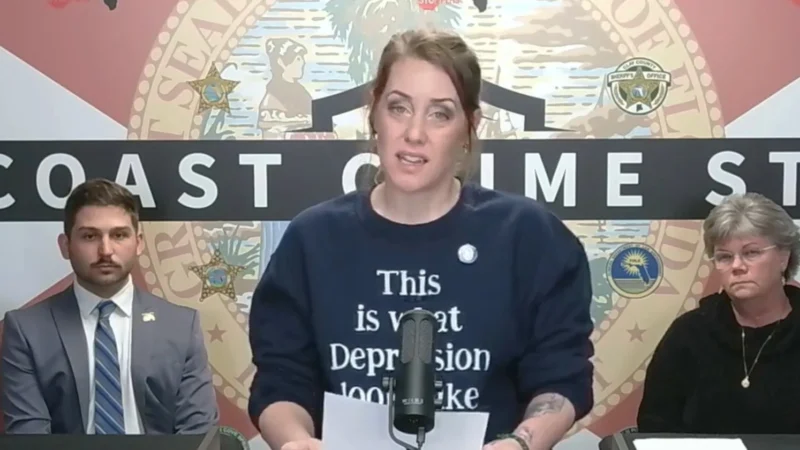Jacksonville lawmakers approved legislation Tuesday asking the Florida DOGE task force to review the city’s finances.
That’s despite assertions from the mayor’s office that the city has been communicating and cooperating with the state entity since March.
City Council voted 13-5 to sign off on Resolution 2025-0259, introduced by Republican at-large council member Terrance Freeman. The resolution called for sending a request to Gov. Ron DeSantis’ Florida Department of Government Efficiency to review the city’s budget expenditures.
City Chief Communications Officer Phil Perry told Jacksonville Today that officials in Mayor Donna Deegan’s administration responded to questions and provided documents requested in two letters sent by the Florida DOGE team in March and April.
Freeman defended his resolution before Tuesday’s vote, saying the request for a Florida DOGE review of the city’s finances to find waste and inefficiency is about transparency.
But detractors on council say the bill is an example of growing political polarization at City Hall and inviting more state government influence in local affairs.
”One of the questions asked in this journey was, was this political? The answer to that is no,” Freeman said Tuesday. “It simply allows another layer of transparency to be added to the process.”
In a news release after the vote, Freeman said all Duval County taxpayers “will benefit from the checks and balances of this legislation.”
The bill voluntarily requests a financial review of Jacksonville and Duval County’s budget and expenditures by the Florida Department of Government Efficiency, or DOGE.
Freeman’s resolution also expresses overall support for DeSantis’ executive order 25-44, which established the state-level DOGE, taking its queue from the controversial federal effort by President Donald Trump and his billionaire adviser, Tesla, SpaceX and X CEO Elon Musk.
Part of the Florida DOGE’s stated goal is to examine local governments’ spending on grants, programs and other expenditures for waste, find possible efficiencies and provide recommendations to local officials based on its findings.
The local bill was amended in the council’s Finance Committee last week to change Freeman’s call for a financial “audit” from the Florida DOGE to a “review.”
Other additions call for requesting that Florida DOGE use only publicly available information in its review and directing the city’s Legislative Services Division to send a copy of the resolution to the governor’s office after it was approved.
DOGE descent
Council members Jimmy Peluso, Matt Carlucci, Tyrona Clark-Murray, Ju’Coby Pittman and Rahman Johnson voted against the measure Tuesday. Reggie Gaffney Jr. was not present for the vote.
Before the vote, Peluso said the DOGE process will further compromise the “Home Rule” autonomy that Florida cities and counties have historically held from the state government in Tallahassee.
He also pointed to the reference to the Trump administration in the official bill summary as evidence that Freeman’s bill is politically motivated.
“The reeks of politicization,” Peluso said. “Home Rule is incredibly important in this state. And as we’ve seen time and time again, Tallahassee keeps creeping into the different things that municipalities and counties should be handling on their own. … This is just another way to try to politicize this city, and it is sickening.”
The Florida DOGE review is another layer on top of other financial reviews underway at City Hall, both mandatory and voluntary.
Deegan has launched a series of government efficiency initiatives, piloting an artificial intelligence program in the city budget process, and a budget transparency dashboard.
Council member Ron Salem launched his own local Duval DOGE reviewing the city’s spending on capital projects.
Council also hires an outside firm to review city finances annually, as required by the City Charter.
Johnson urged the council Tuesday to keep this type of audit work within the local jurisdiction.
”Efficiency comes with one central thing first, and that’s listening,” Johnson said. “Do not invite people into our house, in a house that’s well built, in a house that we’re working to correct. Let us work together here in Jacksonville, inclusively and collectively.”
DOGE requests
By the time Freeman’s bill was introduced in April, officials in Deegan’s administration had been in contact with Florida DOGE for nearly a month.
Jacksonville received two letters sent by Florida DOGE through the governor’s office to local and county governments across the state.
A letter dated March 18 requested documentation of any failure to pay loan obligation, debt service payments, tax transfers or fund balance deficits.
A second letter dated April 11 encourages local and county governments to provide documents to supplement publicly available information on programs, budgets and spending including:
- Budget and spending reports at a line-item level of detail for each department.
- Position descriptions and salaries (or salary ranges) for each employee (names and other idenfiable information can be withheld).
- All contracts with total costs, deliverables, spending amounts, and whether the contract was awarded competitively or noncompetitively.
- All grants made to each recipient, and subrecipients where applicable, with descriptions and purposes.
- Services delivery metrics and performance for all departments.
- Hours worked by department, and projects and task completed.
When asked about the passage of Freeman’s bill, Perry said the mayor’s office has no additional comment beyond their previous statement in April, which called the resolution a duplication of the council’s annual process hiring an independent external auditor to examine city finances outlined in the City Charter.







